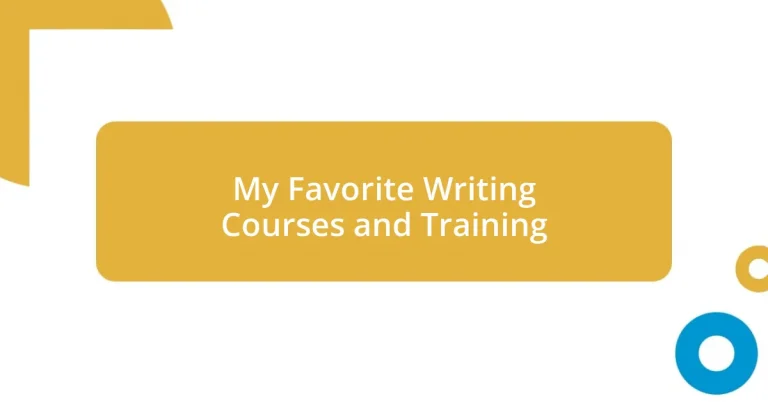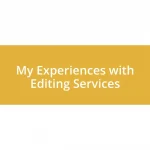Key takeaways:
- Writing courses, whether in-person or online, enhance creativity, skills, and confidence through structured learning and feedback.
- Specialized courses for different genres allow writers to hone specific techniques, such as pacing in suspense writing or world-building in fantasy.
- Peer interaction and networking during writing workshops can lead to valuable collaborations and lasting relationships within the writing community.
- Success stories highlight how focused lessons can transform passion into publications and personal narratives into powerful storytelling.
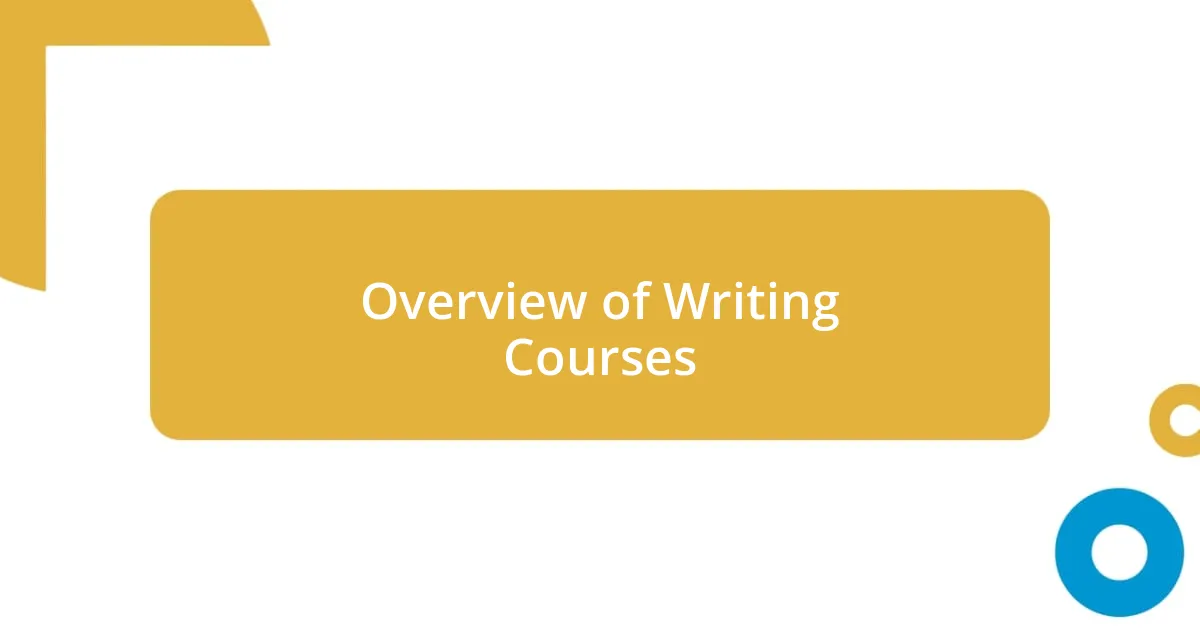
Overview of Writing Courses
When exploring writing courses, I often find myself reflecting on their various types and purposes. From creative writing to technical communication, each course offers something unique, catering to different interests and skill levels. Have you ever noticed how a single online module can open up an entirely new avenue of creativity? That’s the magic of writing courses.
In my journey, I’ve taken numerous courses, each with its own flair and approach. I remember a particular workshop that focused on character development—what a transformative experience that was! It taught me not just to craft believable characters but to breathe life into them, making them relatable and memorable. Have you ever felt a character in a book resonate so deeply that you questioned their existence? That’s what the right course can inspire within us.
Reflecting on the variety of platforms available, from local community colleges to online workshops, there’s almost no limit to what you can learn. Some courses focus heavily on grammar and style, while others emphasize storytelling techniques. Which route would you take? Personally, I lean towards those that foster creativity, as they nurture my voice and expression, adding layers to my writing that I didn’t know existed.
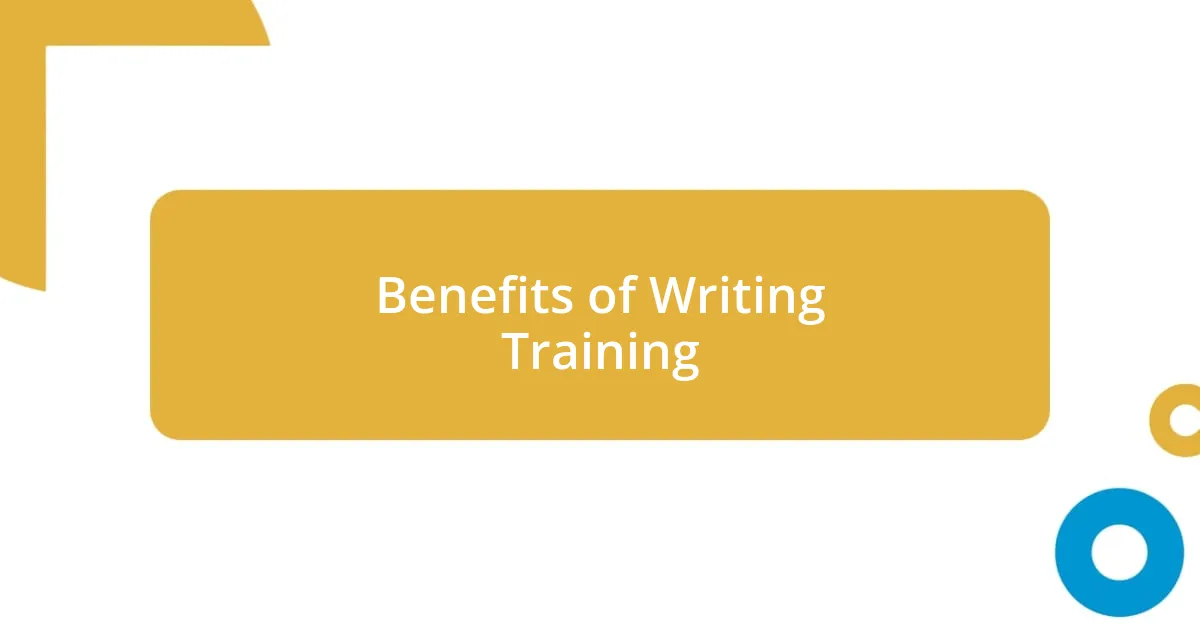
Benefits of Writing Training
Writing training offers a plethora of benefits that can truly enhance one’s craft. One of the most significant advantages is the skills development that comes from structured learning. I vividly recall attending a poetry workshop where I learned to experiment with meter and rhyme. That experience not only refined my poetic voice but also instilled a newfound confidence in expressing my emotions through words. It was enlightening to see how specific techniques could evoke such strong feelings in readers.
Here are some key benefits of writing training:
- Enhanced Skills: Courses provide targeted instruction that sharpens writing techniques.
- Increased Confidence: Regular practice and feedback from instructors help build self-assurance.
- Creative Growth: Engaging with different forms of writing can spark new ideas and inspire creative breakthroughs.
- Networking Opportunities: Writing courses often connect you with like-minded individuals, fostering relationships that can lead to collaborations.
- Accountability: Enrolling in a course establishes a routine and encourages commitment to writing goals.
These benefits contribute not only to personal growth as a writer but also to the overall enjoyment of the craft itself.
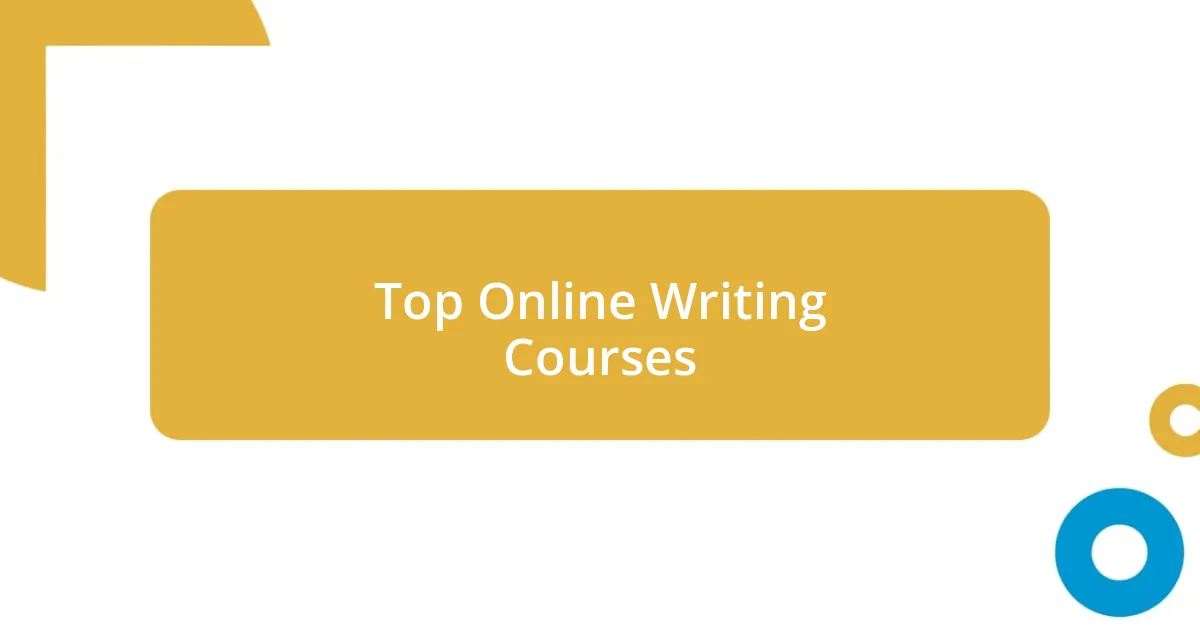
Top Online Writing Courses
In the realm of online writing courses, a few stand out for their unique offerings and community engagement. One that I particularly enjoyed was offered through Coursera, featuring lectures from published authors. I can still recall the thrill of receiving direct feedback on my writing from someone whose work I had admired for years. It was eye-opening to see how small adjustments could elevate my prose, and it solidified my belief that online courses can bridge the gap between aspiring and established writers.
Another fantastic course I’ve explored is on MasterClass, where renowned writers share their craft in a highly engaging format. Their approach to storytelling was nothing short of inspiring. I remember sitting on my couch one evening, captivated by their insights; I felt as if I were having a conversation with a mentor about my own work. Have you ever found yourself immersed in a lesson, your pen flying across the page, scribbling down ideas? That passion is what these courses can ignite in aspiring writers.
This richness in learning environments truly enhances the writing journey, with each course tailored to different styles and goals. Whether it’s honing your dialogue skills or mastering narrative structure, the right course can be a transformative experience. I believe that investing in education is an investment in oneself, and finding a course that resonates with you can make all the difference in your writing path.
| Course | Platform |
|---|---|
| Creative Writing Specialization | Coursera |
| Storytelling MasterClass | MasterClass |
| Advanced Writer’s Toolkit | edX |

In-Person Writing Workshops
Attending in-person writing workshops has always felt like a rejuvenating experience for me. I remember one particular workshop where we gathered in a cozy, sunlit room, surrounded by fellow writers who shared their diverse backgrounds. It was invigorating to exchange ideas and challenge each other’s perspectives. The energy in those spaces ignites creativity in ways that virtual platforms can sometimes miss. Have you ever felt that electric buzz of inspiration just from being around other passionate people?
What stands out to me are the moments of spontaneity that in-person settings provide. One day during a writing exercise, we were tasked with a prompt that took us outside into the bustling streets. It felt liberating to step away from our usual writing spaces and draw inspiration from the world. As I penned down my thoughts amidst the sounds of the city, I could feel my words flowing more freely. It reminded me that different environments can stimulate our creativity in profound ways.
The personalized feedback you receive in workshops is another incredible perk. There was a time when a peer’s thoughtful critique turned a piece I was struggling with into something truly powerful. Their insights emphasized how collaboration often brings out the best in us, showcasing the importance of community in a writer’s journey. How often do you get the chance to share your work like that, in a place where everyone is rooting for each other? Each interaction felt like a stepping stone, paving the way for our individual writing paths.
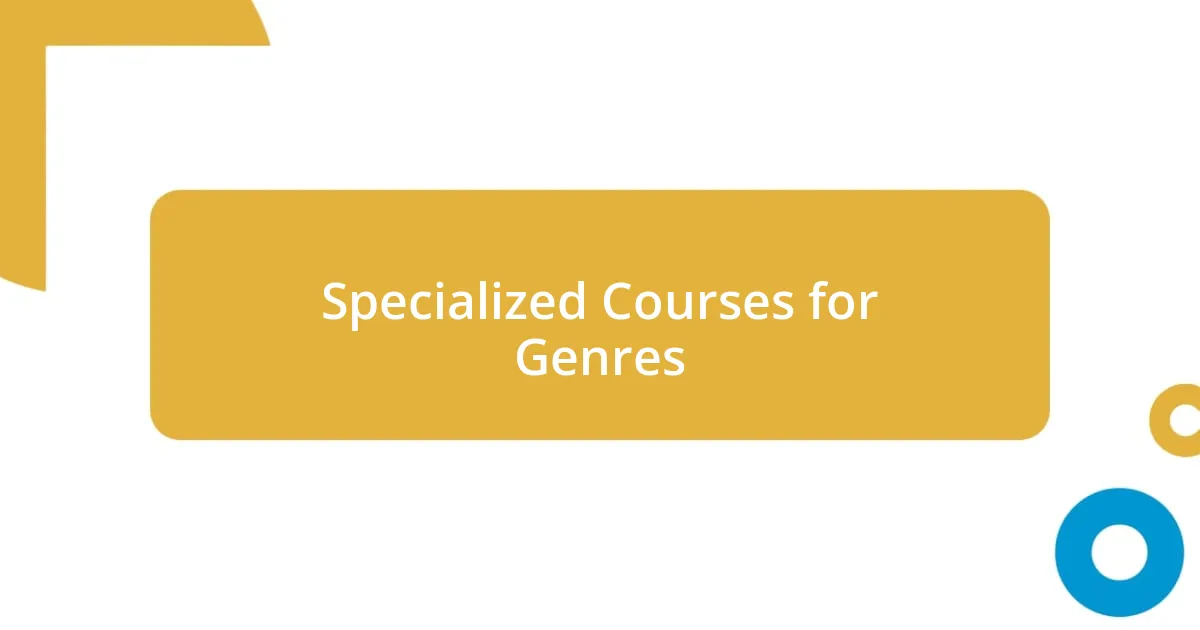
Specialized Courses for Genres
Specialized writing courses for genres can truly sharpen your skills in targeted ways. I once took a course focused solely on fantasy writing, and it opened my eyes to the intricate world-building required for that genre. Did you know that developing a rich backdrop is just as crucial as character development? I learned how even a city’s lore can breathe life into the story. Experiencing the thematic depth of this genre made me appreciate the nuances of narrative in a way I hadn’t before.
Another memorable experience for me was a course centered on suspense writing. There was a particular lesson on pacing that stuck with me; we dissected our favorite thrillers and understood how tension could be built paragraph by paragraph. It’s fascinating to think about how one well-placed cliffhanger can keep readers on the edge of their seats. I found myself analyzing my own writing with a critical eye afterward, asking, “Am I creating enough suspense to keep my readers guessing?”
Additionally, I enrolled in a poetry course specifically designed for emotional expression. One exercise involved writing a poem in response to a significant personal event. I poured my heart into it, and the process was cathartic. Have you ever felt the healing power of words? The feedback from my peers was invaluable, revealing different interpretations of my work and emphasizing the beauty of diverse perspectives. Each of these genre-focused courses reminded me that mastering the craft often requires immersing oneself in the intricacies of specific styles.
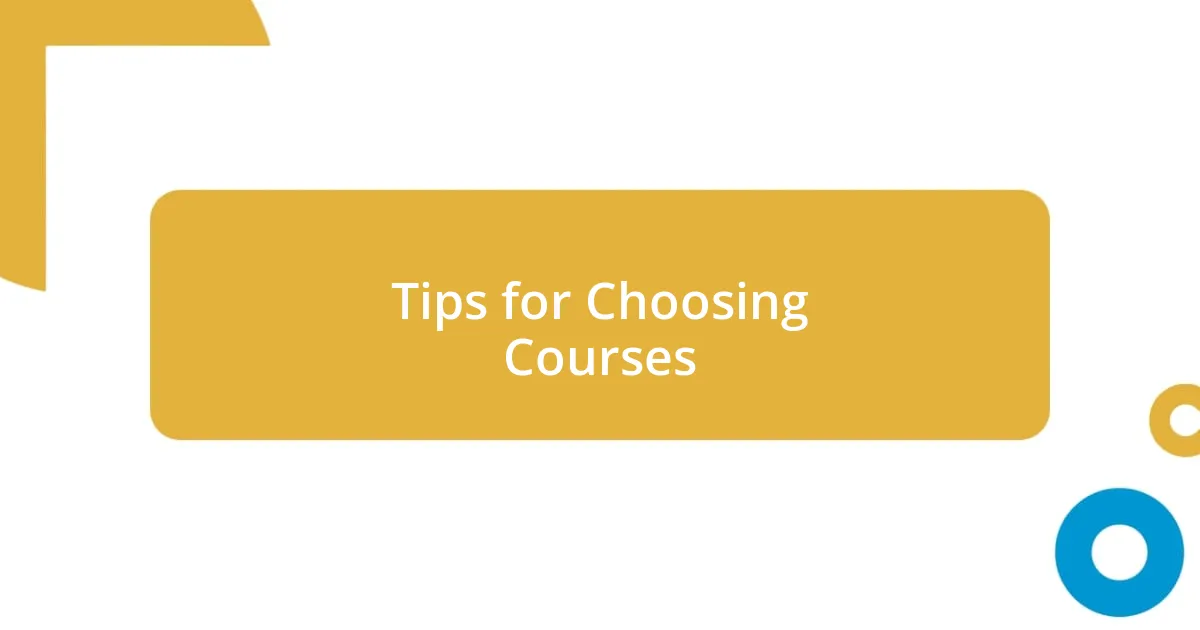
Tips for Choosing Courses
When choosing writing courses, it’s essential to consider your personal goals and what you hope to achieve. I remember when I was at a crossroads, unsure whether to focus on memoir writing or short fiction. I took a moment to reflect on what stories resonated with me most deeply, which helped me select a course that aligned with my passion. Have you ever found clarity by simply asking yourself what speaks to your heart?
Another important aspect is the instructor’s background and style. When I signed up for a screenwriting course, I was thrilled to discover that the teacher had written for major television shows. His insights about dialogue came directly from real-world experience, which made the lessons more impactful. It’s like learning from a master chef versus reading a recipe book—having that insider perspective can elevate your understanding significantly. How can you ensure the instructor’s teaching style matches your learning preferences?
Lastly, don’t underestimate the value of peer interaction in a course. In one workshop, we formed small critique groups, and we each gained fresh perspectives that I never would have considered on my own. I remember feeling both nervous and excited sharing my work, but the constructive feedback motivated me to refine my voice. If the course offers opportunities for collaboration, jump at them! Connecting with fellow writers can ignite not only your creativity but also foster lasting friendships.
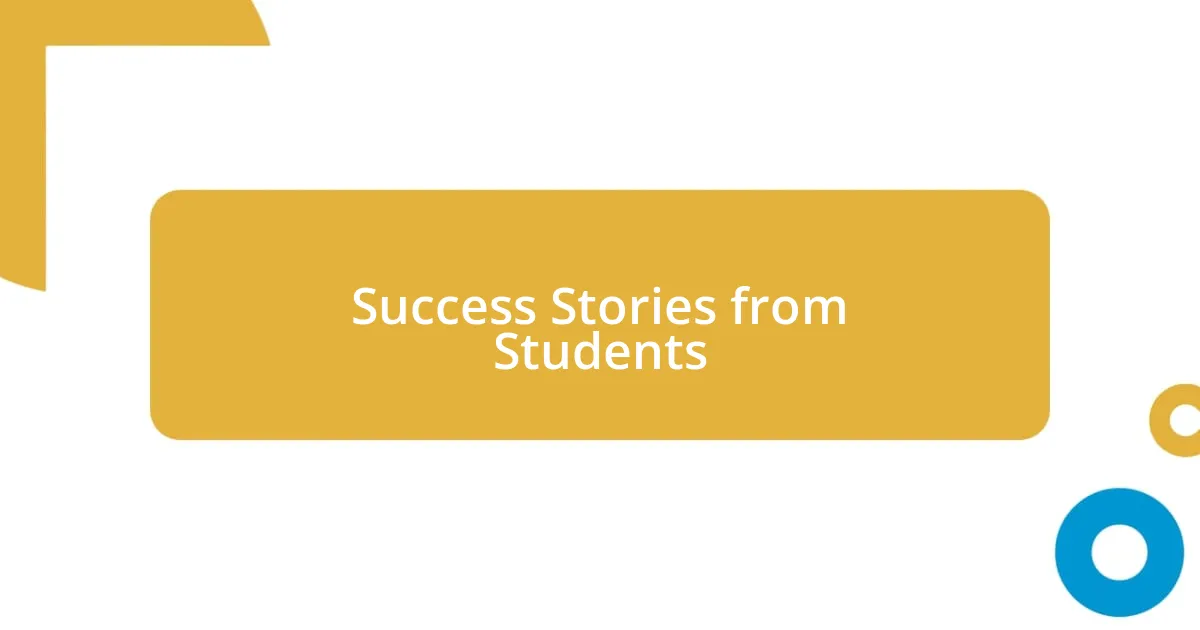
Success Stories from Students
One student, after completing a travel writing course, shared how she transformed her passion for exploration into vivid narratives. She combined practical advice from the course with her personal experiences, leading to her first published article in a renowned travel magazine. Isn’t it incredible how a few focused lessons can launch someone’s career into uncharted territories?
Another success story that resonated with me involved a young writer who struggled with character development. Through a workshop focused on creating compelling protagonists, he not only crafted memorable characters but also discovered his unique storytelling voice. His internal journey prompted him to ask, “What drives my characters, and how do they reflect my own experiences?” This introspection was pivotal, enabling him to connect with readers on a deeper level.
I once met a participant from a nonfiction writing course who shared how writing about her family’s immigration story helped her reclaim her identity. The course not only equipped her with essential writing techniques but also gave her a platform to share raw, honest narratives. Can you imagine finding strength in vulnerability? Her journey inspired me to consider the power of personal storytelling and how it can impact both the writer and the audience profoundly.












